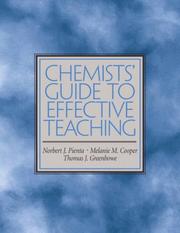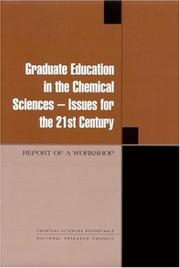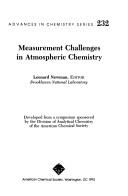| Listing 1 - 10 of 25 | << page >> |
Sort by
|

ISBN: 9780131493926 0321611950 9780321611956 0321611950 9780321611956 0131493922 Year: 2005 Publisher: Upper Saddle River Pearson education
Abstract | Keywords | Export | Availability | Bookmark
 Loading...
Loading...Choose an application
- Reference Manager
- EndNote
- RefWorks (Direct export to RefWorks)

ISBN: 0309071305 0309514703 9780309514705 9780309071307 0585351058 9780585351056 0309171725 Year: 2000 Publisher: Washington, D.C. : National Academy Press,
Abstract | Keywords | Export | Availability | Bookmark
 Loading...
Loading...Choose an application
- Reference Manager
- EndNote
- RefWorks (Direct export to RefWorks)

ISBN: 0841221979 Year: 1992
Abstract | Keywords | Export | Availability | Bookmark
 Loading...
Loading...Choose an application
- Reference Manager
- EndNote
- RefWorks (Direct export to RefWorks)
Periodical
ISSN: 00131350 Publisher: London
Abstract | Keywords | Export | Availability | Bookmark
 Loading...
Loading...Choose an application
- Reference Manager
- EndNote
- RefWorks (Direct export to RefWorks)
$a54 --- Biomedische laboratoriumtechnologie --- Chemie --- Didactiek : chemie --- Periodicals --- Chemistry --- Study and teaching --- Didactics of chemistry --- Chimie --- Etude et enseignement --- Périodiques --- Chemistry - Study and teaching - Periodicals --- Chemistry - periodicals
Book
ISBN: 3031349733 3031349725 Year: 2023 Publisher: Cham : Springer International Publishing : Imprint: Springer,
Abstract | Keywords | Export | Availability | Bookmark
 Loading...
Loading...Choose an application
- Reference Manager
- EndNote
- RefWorks (Direct export to RefWorks)
This book tells the story of how chemists, physicians, and surgeons attempted to end the problem of urinary stones. From the late eighteenth to the early nineteenth centuries, chemists wanted to understand why the body formed urinary, pancreatic, and other bodily stones. Chemical analysis was an exciting new means of understanding these stones and researchers hoped of possibly preventing their formation entirely. Physicians and surgeons also hoped that, with improved chemical analysis, they would eventually identify substances that would reduce the size of stones, leading to their easier removal from the body. Urinary stones and other stones of the body caused the boundaries of surgery, chemistry, and medicine to blur. The problem of the stone was transformational and spurred collaboration between chemistry and medicine. Some radical physicians in America and Britain combined this nascent medical advancement with older disciplines, like humoral theory. Chemists, surgeons, and physicians in Charleston, Philadelphia, and London focused on the stones of the body. Chemical societies and museums also involved themselves in the problem of the stone. Meanwhile, institutions in Charleston, Philadelphia, and London served as repositories of specimens for testing and study as previously disparate practitioners and disciplines worked toward the comprehensive knowledge that could, perhaps, end suffering from stones. The primary audience of this book is historically-minded chemists, surgeons, physicians, and museum professionals.
Chemistry—History. --- Medicine—History. --- Science—History. --- Chemistry—Study and teaching. --- History of Chemistry. --- History of Medicine. --- History of Science. --- Chemistry Education.
Book
ISBN: 9400791372 140209731X 9786612292613 1282292617 1402097328 Year: 2009 Publisher: Dordrecht, The Netherlands : Springer,
Abstract | Keywords | Export | Availability | Bookmark
 Loading...
Loading...Choose an application
- Reference Manager
- EndNote
- RefWorks (Direct export to RefWorks)
This volume is a collection of selected papers presented at the 20th International Conference on Chemical Education (ICCE) held in Mauritius from 3rd to 8th August 2008. ICCE is the main conference of the Committee for Chemistry Education of the International Union of Pure and Applied Chemistry (IUPAC) and has adopted the theme "Chemistry in the ICT Age" in line with a worldwide trend in Science and Technology development. The papers in this volume cover topics ranging from fundamental to applied chemistry, such as Arts and Chemistry Education, Biochemistry and Biotechnology, Chemical Education for Development, Chemistry at Secondary Level, Chemistry at Tertiary Level, Chemistry Teacher Education, Chemistry and Society, Chemistry Olympiad, Context Oriented Chemistry, ICT and Chemistry Education, Green Chemistry, Micro Scale Chemistry, Modern Technologies in Chemistry Education, Network for Chemistry and Chemical Engineering Education, Public Understanding of Chemistry, Research in Chemistry Education, Science Education at Elementary Level.
Chemistry -- Study and teaching -- Congresses. --- Chemistry -- Study and teaching. --- Chemistry. --- Chemistry --- Education --- Social Sciences --- Physical Sciences & Mathematics --- Chemistry - General --- Education, Special Topics --- Study and teaching --- Information technology --- IT (Information technology) --- Education. --- Science education. --- Science Education. --- Technology --- Telematics --- Information superhighway --- Knowledge management --- Physical sciences --- Science --- Study and teaching. --- Science education --- Scientific education
Book
ISBN: 0023547804 9780023547805 Year: 1973 Publisher: New York Macmillan
Abstract | Keywords | Export | Availability | Bookmark
 Loading...
Loading...Choose an application
- Reference Manager
- EndNote
- RefWorks (Direct export to RefWorks)
Didactics of chemistry --- Didactics of physics --- Chemistry --- Physics --- Study and teaching (Secondary) --- Basic Sciences. Chemistry --- Chemistry (General) --- Study and teaching (Secondary). --- Chemistry (General). --- Chemistry - Study and teaching (Secondary) --- Physics - Study and teaching (Secondary)
Book
ISBN: 9173462098 9789173462099 Year: 1988 Volume: 69 Publisher: Göteborg Acta universitatis Gothoburgensis
Abstract | Keywords | Export | Availability | Bookmark
 Loading...
Loading...Choose an application
- Reference Manager
- EndNote
- RefWorks (Direct export to RefWorks)
Chemistry --- Matter --- Study and teaching --- -Matter --- -Atoms --- Dynamics --- Gravitation --- Physics --- Substance (Philosophy) --- Physical sciences --- -Study and teaching --- -Chemistry --- Atoms --- Chemistry - Study and teaching - Sweden --- Matter - Study and teaching - Sweden
Book
ISBN: 9048180139 140208871X 9786612036224 128203622X 1402088728 Year: 2009 Publisher: Dordrecht : Springer,
Abstract | Keywords | Export | Availability | Bookmark
 Loading...
Loading...Choose an application
- Reference Manager
- EndNote
- RefWorks (Direct export to RefWorks)
Chemistry seeks to provide qualitative and quantitative explanations for the observed behaviour of elements and their compounds. Doing so involves making use of three types of representation: the macro (the empirical properties of substances); the sub-micro (the natures of the entities giving rise to those properties); and the symbolic (the number of entities involved in any changes that take place). Although understanding this triplet relationship is a key aspect of chemical education, there is considerable evidence that students find great difficulty in achieving mastery of the ideas involved. In bringing together the work of leading chemistry educators who are researching the triplet relationship at the secondary and university levels, the book discusses the learning involved, the problems that students encounter, and successful approaches to teaching. Based on the reported research, the editors argue for a coherent model for understanding the triplet relationship in chemical education.
Chemistry --Study and teaching. --- Chemistry. --- Chemistry --- Chemistry - General --- Education, Special Topics --- Education --- Physical Sciences & Mathematics --- Social Sciences --- Study and teaching --- Chemical models. --- Study and teaching. --- Models, Chemical --- Models --- Education. --- Science education. --- Science Education. --- Science --- Science education --- Scientific education
Book
ISBN: 0309295866 0309295874 0309295890 Year: 2014 Publisher: Washington, District of Columbia : National Academies Press,
Abstract | Keywords | Export | Availability | Bookmark
 Loading...
Loading...Choose an application
- Reference Manager
- EndNote
- RefWorks (Direct export to RefWorks)
"Undergraduate Chemistry Education is the summary of a workshop convened in May 2013 by the Chemical Science Roundtable of the National Research Council to explore the current state of undergraduate chemistry education. Research and innovation in undergraduate chemistry education has been done for many years, and one goal of this workshop was to assist in the transfer of lessons learned from the education research community to faculty members whose expertise lies in the field of chemistry rather than in education. Through formal presentations and panel discussions, participants from academia, industry, and funding organizations explored drivers of change in science, technology, engineering and mathematics education; innovations in chemistry education; and challenges and opportunities in chemistry education reform. Undergraduate Chemistry Education discusses large-scale innovations that are transferable, widely applicable, and/or proven successful, with specific consideration of drivers and metrics of change, barriers to implementation of changes, and examples of innovation in the classroom."--
Chemistry - Study and teaching (Higher) - United States - Evaluation. --- Chemistry --- Educational change --- Educational innovations --- Natural Science Disciplines --- Disciplines and Occupations --- Physical Sciences & Mathematics --- Chemistry - General --- Research --- Study and teaching (Higher) --- Evaluation --- Evaluation.
| Listing 1 - 10 of 25 | << page >> |
Sort by
|

 Search
Search Feedback
Feedback About UniCat
About UniCat  Help
Help News
News